Home » Commentary » Opinion » Coronavirus response: the great self-destruction
· Canberra Times

 If you want to know how much the COVID-19 coronavirus pandemic might cost, the International Monetary Fund’s recent world economic outlook is a good place to start.
If you want to know how much the COVID-19 coronavirus pandemic might cost, the International Monetary Fund’s recent world economic outlook is a good place to start.
Not that any economic forecasts are ever accurate, but our politicians making the big decisions need some guidance – and the IMF’s forecasts are as good as any.
Whatever the precise numbers, it is obvious that economies around the world are taking a hit of historic proportions. The numbers the IMF has come up with are truly hair-raising and should cause any politician to think twice about the current lockdowns.
Following on from the Great Depression of the 1930s and the Great Recession of 2008-09 (better known in Australia as the GFC), the IMF is calling this the Great Lockdown. Time will tell whether that name sticks, or some other name better captures the essence of what is happening. Other possibilities that come to mind include the Great Miscalculation, or the Great Self-destruction, which allude to the fact that this recession (or depression) is one that has come about by deliberate policy choice – a result of isolating people and shutting down vast swathes of the economy at enormous cost. This is being done on the advice of one set of medical experts which is vigorously contested by others.
Economists, if they can be heard above the din, can only point out the costs, ask whether they are worth the benefits, and query whether there isn’t a better way that can achieve much the same benefits at much lower cost. One ABC journalist recently dismissed the economic dimension with the philosophical thought that we “live in a community, not in an economy”. A better way of looking at it is that we live in a community served by an economy – and the weaker the economy, the poorer the standard of living of the community.
The caveman lived in a community but had a lousy standard of living because his economy didn’t amount to much. The modern economy isn’t just capitalists and Wall Street – it is jobs, wages, and consumption of goods and services that sustain our high standard of living. That is what is at stake in this slump.
Under a scenario in which the current quarter sees the worst of it for the world economy and a vigorous recovery starts in the September quarter, the IMF sees global GDP shrinking by 3 per cent in 2020 as a whole.
This may not sound like much, but it is much worse than the GFC recession. They see a bounce-back in 2021, but by the end of that year GDP will still be below where it would have been had the coronavirus never happened. In this scenario – which is by no means the worst the IMF can envisage – the shortfall of predicted GDP from what it would have been without the virus is a staggering $US15 trillion in 2020 and 2021 (our share of which is close to $A300 billion).
The global loss is like shutting down the entire US economy for the rest of this year, or putting the economies of Japan, Germany, France and Canada into a coma for a whole year. The cost in unemployment is measured in the tens of millions.
And the damage won’t end in 2021. The longer a recession or depression continues, the more long-lasting damage it does.
This is a use-it-or-lose-it story. The more an economy’s productive capacity goes unused – through unemployment, closed businesses and idle plant, for example – the more of it is lost forever and has to be recreated in the future, which at best takes a long time.
The longer people are unemployed, the harder it is for them to re-enter employment later. The less firms invest now, the less capital and productivity there will be in the future. The longer firms are shut down in the slump, the more that will never re-open.
This is why it is so important that the economic self-destruction of the lockdown be as short as possible. It is already too late to avoid a terrible June quarter, but it is not too late to take action – by loosening restrictions – that will avoid economic costs of the magnitude the IMF is predicting later in 2020 and beyond.
And it is not just a matter of economic costs, but also the social and health costs of isolation – disrupted education and training, family break-down, mental health, and delayed medical and dental care. Every extra day of restrictions at the current level brings a fearful future cost.
Coronavirus response: the great self-destruction